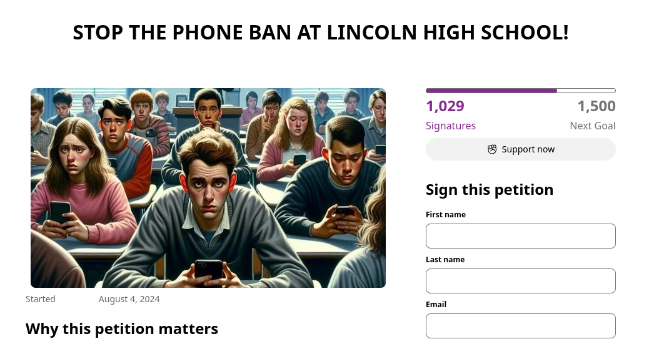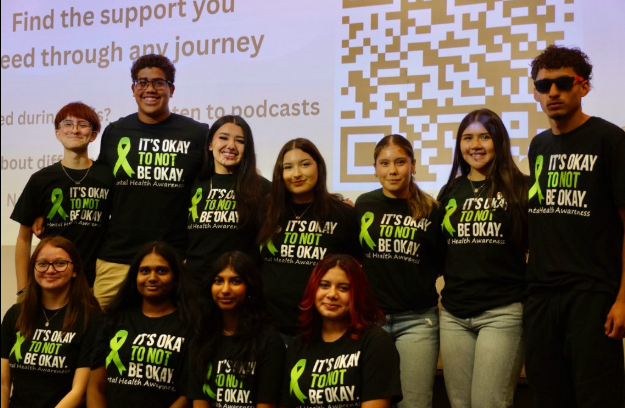Stockton- Over the summer, Lincoln High School announced that in the 2024-2025 school year, they would be implementing a new cell phone policy. This cell phone policy was that at the beginning of each class students would place their cell phones in a box, pouch, or a different kind of holding system to prevent students from being on their phone during class. While some teachers began this process in prior years under their own volition, this school year it has become mandatory that all teachers follow this new procedure. However, there are still many lingering questions and opinions about whether or not the policy is a good idea.
According to information presented in the Lincoln handbook and interviews done with KCRA 3, a public news outlet, the new policy is intended to stop the inappropriate usage of phones during class time. Phones have been used more than ever to distract students from valuable class time, so the solution the district made was to remove the distraction. They find this to also be valuable in many other scenarios, like in cyberbullying, emergencies and cheating. By restricting the use of student cell phones, they believe that they will decrease the spread of misinformation regarding other students or dangerous situations like a lockdown or fire. While it is too early in the year to determine if the new policy has helped resolve all of the concerns, some of our teachers here have some insight on how it has affected their classes.
Mrs. Myers, a math teacher here at Lincoln, provided some insight on how the phone policy has affected her classroom. According to her, students’ engagement and participation has gone up because “[students] are not distracted by social media, whether they’re getting a text or any of the drama that goes on during the day.” She goes on to say that even outside of the classroom, like during our Back to School rally, she saw higher engagement than prior to the new phone policy. “There were so many more people that were engaged in the rally and they were cheering, and because they didn’t have their phones to distract them and get on social media, they were actually looking at the performances and engaging.” Continuing on the path of teachers, Signor Mariani, the Italian teacher at Lincoln for over 20 years, also had some opinions regarding the new policies. He stated how it was “long overdue” and needed in order to maintain not only a stable class environment but to fully eliminate a long lasting distraction that is created the moment a student gets a phone. After asking if he thought it was more beneficial or harmful, he said, “Students aren’t tempted to check their phone regarding notifications or viewing social media throughout the class.” Signor Mariani sees that this new cell phone policy will continue to be in use in the future and assumes that the regulations taken regarding cell phone use today will carry on and even become far more strict.
Although the staff may feel positive about the new policy, do the students feel the same? Especially when you consider the overwhelmingly negative response the cell phone policy got over the summer. Any student on Instagram or any other social media platform most likely saw the flood of stories on their feed of people complaining about the policy. One student, Carly Monroe, even started a petition to get rid of the phone policy before school had even started.
This petition gained 1,029 signatures but, as evidenced through the school year so far, did not affect the decision at all. However, Carly’s feelings did somewhat change about the policy once school started. While her feelings aren’t 100% positive, she feels rather neutral about the subject, saying “It’s not going to change anytime soon.” So rather than constantly butting heads with teachers on whether or not it is considered “fair” to students, she thinks it’s better to just deal with it and adapt to this new policy. Based upon the responses from teachers, as well as any public information, it seems as though this policy is here to stay, so people should just get used to how things are now.
However, some students feel differently about the policy. Fatema Tawil, a senior here at Lincoln, feels as though there should be a different policy instead of the one we have now, saying that “[students] should have the privilege to at least get [their] phones back after [they’re] done with [their] work.” She argues that it is unreasonable that the school doesn’t even allow you to get your phone back if there is a severe emergency. Regardless of the school stating that they will relay information, many feel like they are not doing a good job of this. She goes on to say that, “the school also isn’t responsible for whatever happens to our phones, so I dont think that’s fair to the students.” This is a concern raised by many students who feel as though their phones are at risk of being damaged or stolen. Tawil thinks the school should’ve given students a heads up weeks before and not so close to the first day of school because she “[doesn’t] believe it’s right that the school can have these opinions about what we can do with [our] phones and [we don’t] have any say about it.” Based upon the results of a small survey, junior and senior students are mixed on whether they believe the phone policy is helpful, but overall the responses are negative.
As Tawil expressed, students worry about being able to contact a parent in an emergency. However, as specified in a KCRA 3 News interview that took place at the school regarding the phone policy, it allows for correct information to be relayed and helps stop misinformation from being spread to parents by the students who may not have full understanding of the situation. Even Mrs. Myers agreed with this saying, “If there is a fire here, you don’t want the parents coming to the school. If there is a gunman outside and we’re on lockdown, you don’t want to put the parents in harm’s way and, as soon as something does happen, the school and the district automatically put out information to parents so they’re all getting the same information and not “he-said-this and she-said-that.” Of course, in an emergency situation, the first thing students think of is, “I need to contact my parents or guardians,” but in the heat of the moment, there is a possibility that the student can spread misinformation that can worsen the situation.
Not everyone will, though. According to a student source, they believe that “it is unnecessary and is hurting the majority of the students while trying to punish the minority of students.“ Which is true, not every student is misbehaving and using their phone during class time or spreading misinformation. However, the reason the policy was enforced was because a mass majority of students were using their phones inappropriately and, although it seems unfair to those who weren’t, there have been indicators that the policy has actually benefited many students. There is evidence of more productivity, participation, attention, and engagement; all factors that lead to a higher chance of success. But some students need music or something to listen to in order to focus better and, while the immediate answer is to get a 504 plan or something similar, that is not easy for everyone to do. A 504 plan allows for a student to be provided with certain accommodations to students who have disabilities, which is a broad term. In this case, it can range from mental, physical or learning disabilities which include ADD, autism, anxiety, etc. Although, not all people who need accommodations can easily get a diagnosis or even need one because some people just learn differently. There are exceptions in the phone policy for certain students who have medical conditions and, therefore, need their phone, but there also should be a way to recognize the students who can focus better with the help of their phone. This is where it can get a little complicated; it is very easy to be dishonest and ruin something that is meant to be helpful to the students who need it.
There are going to be pros and cons to any rule, whether it be in school or not. A pro of the new cell phone policy is improvement in the classroom environment, but a con is the concern for the school staff’s ability to communicate properly in the case of an emergency. The policy is new and there is always room for improvement but, hopefully, with all the feedback from this year, the rules and regulations regarding the policy will become something that everyone is capable of coming to terms with.









